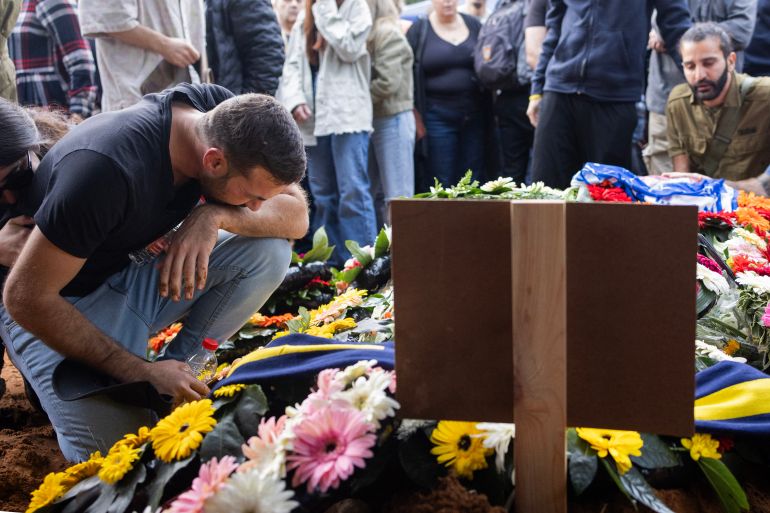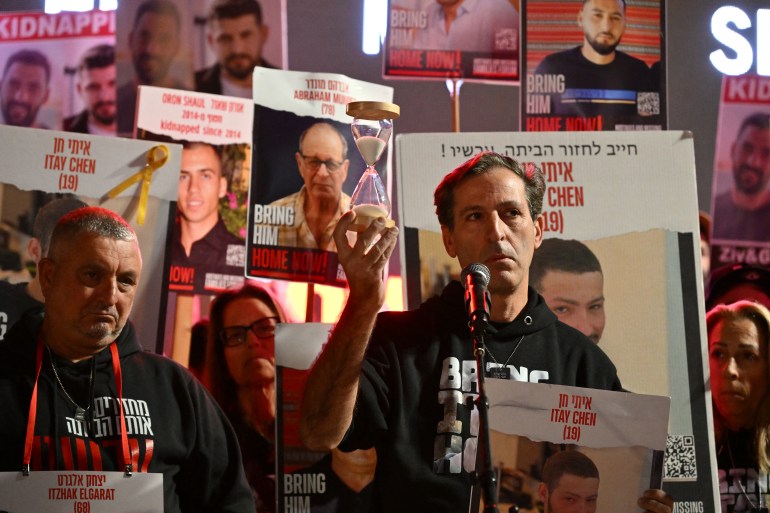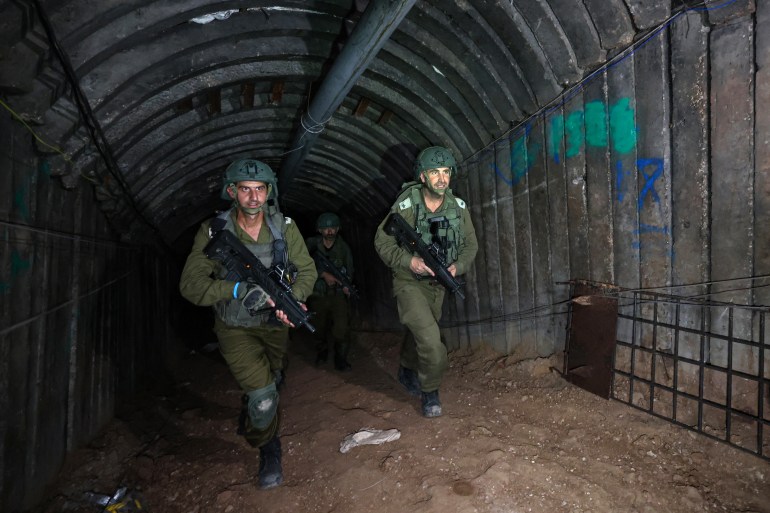Captives mistakenly killed by Israeli troops left SOS signs in Hebrew
The killing of the three men sparks an intense outcry in Israel and raises concerns about its military’s wartime conduct.

Israel’s military says it has discovered distress signals in a Gaza building where three Israeli captives were sheltering before they were mistakenly shot dead by Israeli troops.
The signs, which read “SOS” and “Help, three hostages” in Hebrew, were found in a building in the Shujayea suburb of Gaza City, military spokesperson Rear Admiral Daniel Hagari said on Sunday.
Keep reading
list of 4 itemsOutrage after Israeli forces kill Israeli captives in Gaza
Israel’s Netanyahu hints new deal under way to release Gaza hostages
Photos: Israeli attacks continue as calls for a ceasefire in Gaza grow
The military distributed photographs of the white cloth signs written in red, likely with leftover food. They were hung on a building about 200 metres (220 yards) from where the captives were shot last week, Hagari said.
The killing of the captives, who, Israel’s military said, were fired at despite waving a white flag, has sparked an outcry in Israel and amplified concerns about their military’s wartime conduct.
Ido Shamriz, brother of slain captive Alon Shamriz, accused the Israeli army of “abandoning” and then “murdering” him.
Ruby Chen, father of a 19-year-old captive and soldier still held in Gaza, said the incident made him even more fearful of his son’s fate.
“We feel like we’re in a Russian roulette game [finding out] who will be next in line to be told the death of their loved one,” Chen said.

The captives’ deaths also added to Israeli concerns that their government and military are more focused on eliminating Hamas than rescuing at least 100 captives believed still to be in captivity in Gaza.
Hamas last month said about 60 captives had been killed or were missing due to the Israeli bombardment. Israel has confirmed at least 20 captives have died in Gaza, without saying how it knows this information.
On Saturday, Israeli Prime Minister Benjamin Netanyahu hinted that new negotiations may be under way to recover captives after his intelligence chief met the prime minister of Qatar, a mediator in the conflict.
However, Hamas has said it will not release any more captives until the war ends.
Where are the captives?
Israel believes some of the captives may be trapped in Hamas’s sprawling underground tunnel network, complicating the Israeli military’s efforts to root out the group.
On Sunday, Israel’s military announced it had uncovered the largest tunnel it had ever seen in Gaza and promised to search through more tunnels in its pursuit of Hamas.
“We will hunt them even if we need to go down to the tunnels,” Hagari said. “We also need to do it with attention to the rescue of our hostages and the understanding that maybe some of them are in the tunnels.”
The newly discovered Hamas tunnel has an entrance near a key Israeli border crossing, raising additional questions about security failures leading up to the group’s October 7 attacks on southern Israel.

The expansive tunnel, equipped with ventilation and electricity, is twice the height and three times the width of other Gaza tunnels, Israeli officials said. It stretches for more than 4km (2.5 miles) and dives 50 meters (55 yards) below ground at some points.
“Millions of dollars were invested in this tunnel,” Hagari said on Sunday.
“It took years to build. … Vehicles could drive through,” he added. “At this point, this is the biggest tunnel in Gaza.”
Nir Dinar, another Israeli military spokesperson, said Israel had previously failed to spot the tunnel because its border defences detect only tunnels meant to enter Israel.
Israeli officials believed Hamas used the tunnel to move vehicles, fighters and supplies ahead of its October 7 attacks, which killed about 1,200 people, they say.
In retaliation for that attack, Israel has bombed the besieged Gaza Strip for two and a half months and launched a ground invasion, killing more than 19,000 Palestinians, mostly women and children, and reducing much of the enclave to ruins.